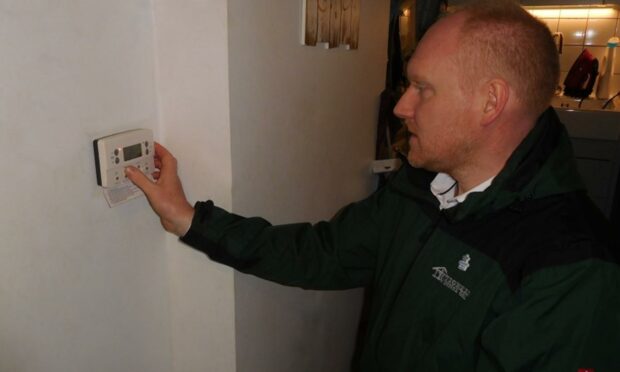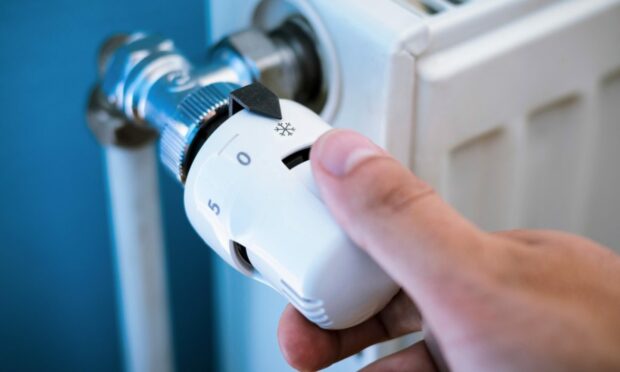Island households face an increasingly “desperate” situation when it comes to heating their homes, and there are warnings the situation is getting worse.
The Western Isles suffers the highest levels of fuel poverty across Scotland at 43%, compared to an average of 24.6% of homes nationally.
The problem is deepening with increased energy costs and some people are only putting heating on for as little as half an hour a day.
To make matters worse, support groups are struggling for funding.
And the loss of two meter readers on the islands is having a major knock-on impact for older residents.
Dan Morrison, energy services director for Tighean Innse Gall, a non-profit organisation based in Stornoway that supports people in fuel poverty, says householders are “crying on the phone” after receiving higher than expected energy bills.
He sounded the alarm as MSPs on a Holyrood committee prepare to discuss the Scottish Government’s draft fuel poverty strategy today.
Why is fuel poverty worse in rural areas?
MSPs heard last week from a group of experts around the Scottish Government’s plan to ensure no more than 5% of households are fuel poor by 2040.
Holyrood’s social security committee were told extreme fuel poverty is “disproportionately higher” in rural and island communities compared to more urban areas.
On the Western Isles, the majority of properties are detached and older which makes them harder to heat and to retain heat.
Mr Morrison says he is “disappointed” by the fuel poverty strategy and believes it fails to recognise the work of local organisations, who refer householders onto national support schemes such as Warmer Homes Scotland.
Yet the future of Tighean Innse Gal is under threat with funding currently only in place until March next year.
It is between heating and eating, and we often hear that.”
– Dan Morrison
The energy services director says his organisation needs “additional help” to stay afloat and assist people who feel “really desperate”.
Ovo Energy, which bought over SSE’s retail division last year, is the main energy supplier on the islands.
However, the takeover resulted in the loss of two meter readers locally who previously visited homes to read meters on behalf of householders.
Instead, bills are calculated on estimated readings, meaning many customers, particularly elderly people, can be “stung by bills”, Mr Morrison claims.
‘It is between heating and eating’
He adds: “It is between heating and eating, and we often hear that.
“People who live locally are only putting on their heating for 30 minutes a day and things like that.
“They get so desperate they think everyone has just given up; that the government has given up on them.
“It’s quite sad to see.
“We need additional help just to take some of the heat off us in terms of the funding.”
The Press and Journal, Evening Express and Original 106 have teamed up with foodbank charity Cfine – which serves Grampian and the Highlands – to help alleviate some of those pressures through the Big Christmas Food Appeal.
We’re attempting to raise awareness of the issues many are facing – like fuel poverty – while asking readers to donate to Cfine’s JustGiving page or pick an item from their Amazon shopping list, with items ranging from a 95p tin of soup to a packet of nappies.
The cost of supplier failures is likely to put pressure on energy bills for the next two or three years.”
– Alastair Wilcox, Citizens Advice Scotland
Alastair Wilcox, senior policy officer at Citizens Advice Scotland, says there are “real concerns” around how the strategy will deliver the targets it sets, particularly in terms of rural and island fuel poverty.
He warned householders are likely to face pressure on energy bills for the next “two or three years”.
However, Mr Wilcox said it was “quite concerning” that the strategy fails to deal with the situation “beyond this winter”.
Not just a winter crisis
Speaking to MSPs last week, he said: “As has been publicised over the last two or three months, energy prices are increasing substantially this winter.
“What has perhaps been less well understood is that this is not just a winter crisis.
“We’re already expecting the price cap to increase by another 40% in the spring.
“It may go up, it may go down, but it’s certainly looking set to be a painful spring next year.
“The cost of supplier failures is likely to put pressure on energy bills for the next two or three years.”
Ovo Energy and the Scottish Government were contacted for comment.


